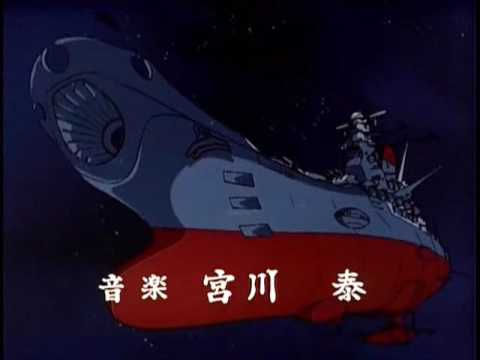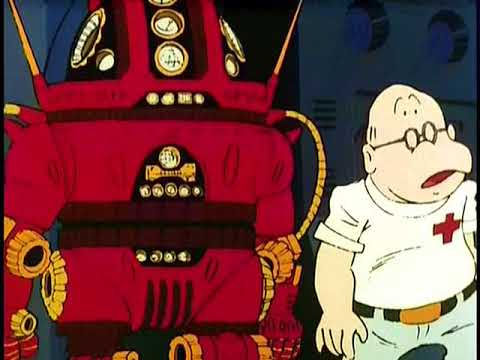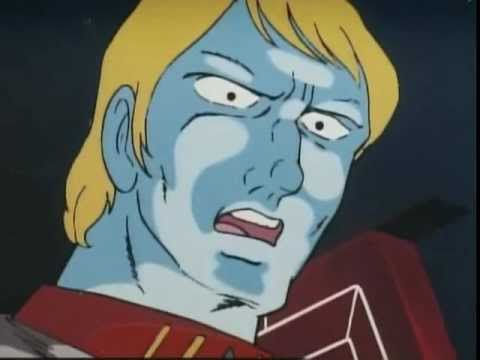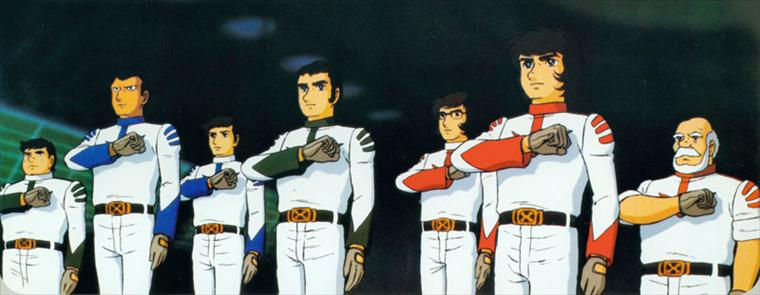Uchuu Senkan Yamato - War is never black or white
- Stephanie
- 5. juni 2019
- 7 min lesing
Note: this post is strictly about the original franchise, not 2199. Also, it's filled with spoilers and will not make sense if you haven't watched the franchise beforehand.
So for the past 20 days I've been watching the original 'Uchuu Senkan Yamato' franchise, and it's absolutely amazing. I've been watching more and more currently airing anime recently, and an expansive space opera from the 70's was, unbeknownst to me, exactly what I needed. Yamato is a sci-fi franchise, and an old at that. The original TV-show debuted in 1974, and has been going strong ever since, with the newest installment in the franchise having been released in 2017. It's safe to say that this is one powerhouse of an anime series. The original TV-show was written by Yoshinobu Nishizaki and directed by manga legend Leiji Matsumoto, who was also responisble for creating 'Uchuu Kaizouku Captain Herlock' and 'Galaxy Express 999'.

But what exactly is it that makes Yamato still worth watching, fourtyfour years after it's initial creation? Well, it's both complicated, and not so much. At it's heart and core, Yamato is a space opera, and a damn good one at that. The plots of each season and movie doen't change very much, they all follow a very strict formula. Earth is in trouble and humanity will die in a short amount of time if nothing is done, and the government and military have no idea what to do. Cue Yamato traveling a long distance through space in search for a planet or item in order to save Earth from it's inevitable destruction. At a glance, one might look at that and think that the franchise is only an uninspired space romp, nothing more and nothing less. However, this could not be further form the truth.
In reality, Yamato is a collection of war stories about the crew aboard the Yamato overcoming their personal problems, and having to deal with the large burden which is always being placed upon them. One thing which especially stands out about the writing in the series is the paralell of the larger conflict of Earth being in danger, with the crew of the Yamato encountering a new problem. Altough this isn't as apparent in the first season, which mostly focuses on the relationship between Kodai and Captain Okita. While the first season is my favorite because of the ending (which I will get into later), It's not the one where Yamato gets into the meat of what it's about; which is comparing the personal conflict of the soldiers with the greater conflict of space "politics" (I use that term very lightly) and humanity's exstinction.

But I've been repeating myself a bit here, so let's get into some examples. In season 2 of Yamato, the larger conflict is the impending invasion of Earth by the White Comet Empire, while the conflict aboard the Yamato is the original crew from the last season having to deal with not only the loss of their Captain, which they relied heavily on, but also Kodai's inability to be an effective leader, as well as a group of unruly and unexperienced soldiers with no discipline, who constantly clash with each other and make a mess of the Yamato. They however, get through it, and there's some very emotional character development and deaths which happen at the end. I want to especially highlight Hajime Saitou, the leader of the new arrivals. In the early episodes, and often in the middle of the series as well, he's shown to be brash, kind of a knucklehead, and unwilling to listen to Kodai. However, in the last few episodes, he's become a better guy. He's still as reckless as always, but he now respects the crew members of the Yamato, who he and his fellow ground soldiers saw as spoiled and sort of "upper class" in comparison to them
I still haven't gotten to my main point though. The main thing which makes Yamato a 10/10 for me. In a lot of TV and movies, there will be a point in the conflict where the villain tells the protaginst during a standoff that "they're just the same" and that what the protagonist is doing is in fact, not that different from what the villain is doing. This is a stupid, overused, and cheesy trope. No one likes it, and I don't understand why it keeps getting used. However, Yamato managed to do this trope, but well. And when I say well, I mean really well.
In the last few episodes of season one, when the Yamato blows up the enemy planet of Gamilus, you get to see the houses fall down and get destroyed. You see the destruction they, the good guys we've been rooting for are causing. This is something the franchise as a whole is really good at doing, showing you people dying. Even if they're just nameless background characters, the way the directing, music and sound effects work together really adds to that effect of "holy shit people are actually dying". But to get back on track, while blowing up Gamilus, Kodai and Yuki look out from the bridge and realize what they've done. That their goals are in fact no different from the enemies. That Lord Desler's goal of finding a new planet to settle because their own was moving towards destruction, is exactly the same as theirs. They also killed hundreds, if not thousands of soldiers, just like Desler did.

In a previous episode, the crew manage to capture a soldier from Gamilus, and after removing his helmet, are shocked to see that he is in fact, human. Not a literal beast or an animal like they had speculated, a human. Sure, he has blue skin, but apart from that he's the exact same. They're horrified that a human could commit such atrocities, and this really drives in the message of the story. In war, both sides have goals, and both sides believe they are the just ones. Desler just wanted a new home planet in an attempt to stop the slow death of his people, and so did Okita, Kodai, and everyone else on the Yamato. I would be here forever if I talked about all the great episodic plots which develop and humanize the rest of the crew, but to keep it short, the amount of great characterization and just how well it is done is nothing short of amazing. Even the robot, Analyzer, gets some characterization, with his episode being one of my favorite in the series.
To break this up from pure unbridled praise, there are indeed a few things I dislike about Yamato. First, the character designs. They're mostly great, Leiji Matsumoto is known for his icnonic characters and he did a good job. Only problem is Starsha and Teresa, who literally have the exact same character design, not to mention that they both get married to a person from Earth who also looks the exact same. This really confused me while watching one of the movies (I don't remember which, it was either Aratanaru Tabidachi or Yamato yo Towa ni), so keeping up with the plot was kind of difficult because of that. Also season 3 introduces some new character who also has the same design as Starsha and Teresa, except she's some ancient ruler turned God or something. It's confusing and not really explained, though it leads to some interesting themes about religious supression.

I don't really want to end this on a bad note though, so just to praise it a bit more, here are some other great things about the show:
1: The Soundtrack
Oh my god the soundtrack in this show. In an age where most anime soundtracks consist of forgettable background music which sounds exactly like every single other show, and where the OP is always some average j-pop song, it really highlights just how great the soundtrack is. Just go listen to 'The Universe Spreading to Infinity', it is a masterpiece of instrumental music, and the rest of the OST doesn't dissapoint either. I will admit though, I was kind of thrown off by the fact that they use the same opening for all three seasons.
2: The Animation (Mostly the Visuals and Art Direction Though)
Yeah, they re-use a bit of animation every now and then in the first two seasons, but when it's good then it's damn good. All the large scale battles have great ship designs and cool explosions, it all feels like it's happening in real time, and just... It just looks really freakin' cool, and I love it.
3: The Yamato
It's the star of the show, the main appeal. A Japanese WW2 warship in space saving Earth from aliens, how cool ain't that? It's hella cool I'll tell you that! All the dials, gauges and meters and tech lookin' stuff in the ship looks really cool, and it makes the Yamato feels so real and advanced.
To wrap it up, Uchuu Senkan Yamato is a masterpiece of anime, and media in general. It influenced Evangelion, (Anno even stated that it was his favorite anime) as well as Gundam and Macross. So to end this post in a good way, here's a qoute from Kazuhiko Shimamoto and Hideaki Anno in an interview they did with Animage Magazine back in 1992.
Shimamoto: In regards to Yamato, people shouldn't feel that they actually have watched it just by watching Yamato movies or edited versions! They have to watch the first TV series! They can't really understand how Yamato's wave gun is a dreadful weapon. When I watch the first TV series in order from the first episode to the 26th, I can't help but be moved by the Yamato's long voyage - 148,000 light years.
Anno: Yamato used to be the best in the quality of the picture in those days, so it is very old. The young animation fans might not be satisfied with it since they have high appreciation as far as picture quality is concerned. But I want them to watch it at least once.
Link to the full interview for those curious: https://web.archive.org/web/20050407200800/http://home.comcast.net/~hasshin/shimamoto.html




Kommentarer